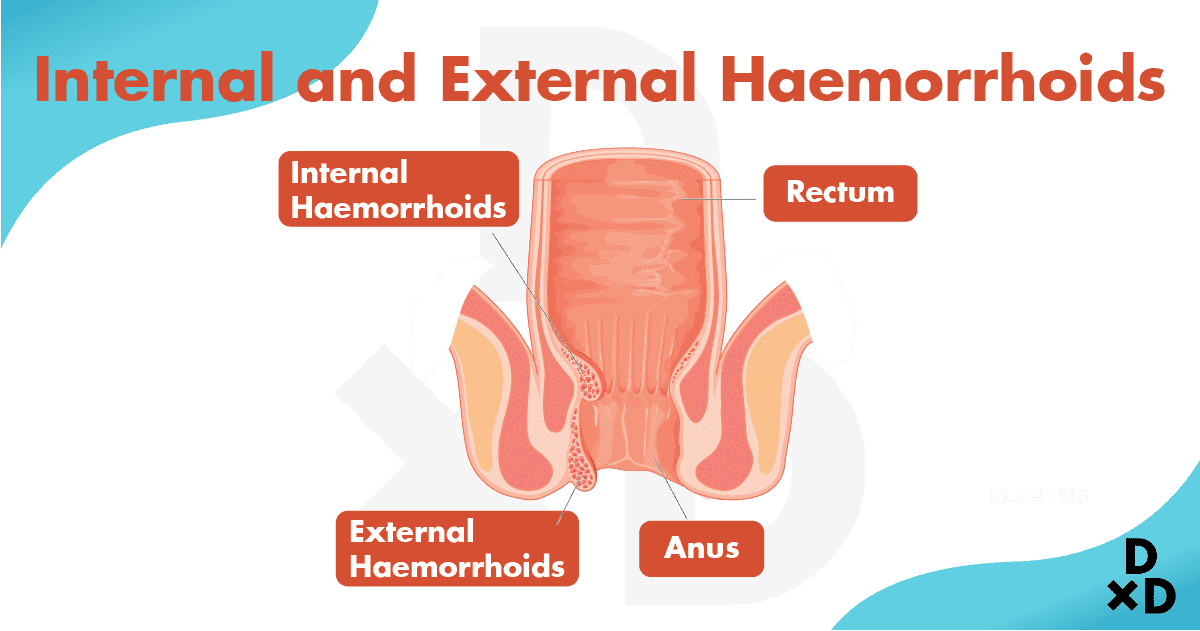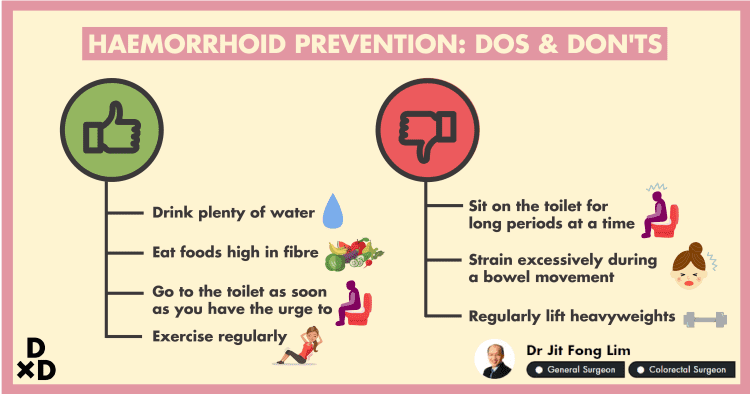Haemorrhoids are actually a very common condition. They can be easily prevented as well. In this article, I will share some simple tips you can adopt to help you prevent haemorrhoids from developing or reoccurring.
Read on to find out!
Firstly, what are haemorrhoids?

Haemorrhoids, also known as piles, are swollen blood vessels in the anus. When a person is well, there are 3 tissue cushions in the anus full of blood vessels. These blood vessels can quickly expand when we sneeze or cough. This rapid cushion expansion helps to prevent gas or stools from leaking out. However, when the cushions are unable to decompress, they can swell. Thus, causing it to become haemorrhoids.
They are classified as 2 types [1]:
- External
- Internal
To list, the symptoms of haemorrhoids include:
- Feeling a lump around your anus
- Itching
- Burning sensation in the anus after passing stools
- Seeing bright red blood on the toilet paper after wiping or in the toilet bowl
- Seeing bright red blood drip into the toilet.
Furthermore, those who are pregnant, overweight, or constipated are more prone to developing haemorrhoids.
What causes them?

Haemorrhoids develop when the veins in your anus become swollen or irritated. With that said, this is due to the increased pressure in the anus.
They are caused by [2]:
- Having a low fibre diet
- Chronic constipation or diarrhoea
- Obesity
- Pregnancy
- Regular heavy weightlifting
- Straining during bowel movement
- Sitting for long periods on the toilet
What can I do if I have haemorrhoids?

Haemorrhoids can usually resolve itself within a few days. Treatments are not required in most cases. However, during the recovery period, one should take the necessary steps to ensure that they do not irritate their haemorrhoid further.
With that said, you are advised to see a doctor if you notice any bleeding during a bowel movement to rule out any serious condition. Medical treatments for haemorrhoids include [3]:
- Oral and topical medication
- Rubber band ligation
- Sclerotherapy
- Surgical removal
How do I prevent haemorrhoids?
If you have gone for medical treatments for haemorrhoids, you will want to avoid having a repeated occurrence. There are a number of ways to prevent haemorrhoids [4]: all of which are very simple to follow.
Here is a list of the dos and don’ts when it comes to preventing them!
Dos
- Make sure you drink plenty of water. Staying hydrated makes your stools soft so that they may pass more easily, preventing irritation to the haemorrhoid.
- Eat foods high in fibre. You should aim to have 50% of your food intake be from vegetables and fruits.
- Go as soon as you have the urge to.
- Exercise regularly. Exercise prevents constipation which helps to reduce the pressure on the veins caused by prolonged straining. Besides that, it also helps you to lose the weight that might be adding pressure to the veins in your anus.
Don'ts
- Sit on the toilet for long periods at a time. This adds pressure to the veins in your anus which can cause it to swell. Don’t bring a book, newspaper or mobile phone to the toilet!
- Strain excessively during a bowel movement. Try not to strain for more than 5 minutes while on the toilet.
- Sit for long periods at a time, especially on the toilet.
- Regularly lift heavyweights. Straining to lift weights when squatting can increase the pressure in the anus.
Conclusion
To recap, haemorrhoids are swollen veins in your anus that, in most cases, go away on their own. Despite that, you should still seek medical care if you experience bleeding during a bowel movement to eliminate any other more serious causes.
Medical treatments may range from medications, rubber band ligation, sclerotherapy to surgical removal.
In brief, preventing haemorrhoids from developing can be achievable when you follow the simple measures listed above.
%treatmentquote title=Get quote for Haemorrhoids Treatment%
Dr Lim Jit Fong is a colorectal surgeon at Lim Jit Fong Colorectal Centre. He specialises in general surgery as well as colorectal surgery. Besides that, Dr Lim offers services ranging from anal fissures to functional disorders such as bowel incontinence. Furthermore, he holds several appointments. One of which is the President of the Society for Continence in Singapore.
Also, read more from Dr Lim Jit Fong in his Q&A here.
